 MyDogBreeds
MyDogBreeds Rampur Greyhound is originated from India but Siberian Husky is originated from Russia. Rampur Greyhound may grow 15 cm / 6 inches higher than Siberian Husky. Both Rampur Greyhound and Siberian Husky are having almost same weight. Both Rampur Greyhound and Siberian Husky has same life span. Both Rampur Greyhound and Siberian Husky has almost same litter size. Rampur Greyhound requires Low maintenance. But Siberian Husky requires Moderate maintenance
Rampur Greyhound is originated from India but Siberian Husky is originated from Russia. Rampur Greyhound may grow 15 cm / 6 inches higher than Siberian Husky. Both Rampur Greyhound and Siberian Husky are having almost same weight. Both Rampur Greyhound and Siberian Husky has same life span. Both Rampur Greyhound and Siberian Husky has almost same litter size. Rampur Greyhound requires Low maintenance. But Siberian Husky requires Moderate maintenance
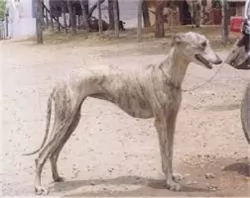 Known also as the North-Indian Greyhound or the Rampur Hound, the Rampur Greyhound is native to the Rampur area of Northern India.
Known also as the North-Indian Greyhound or the Rampur Hound, the Rampur Greyhound is native to the Rampur area of Northern India.
This dog is a member of the sighthound family, and in the past has been sought after for its efforts in controlling jackals.
The dog is also able to cover large distances at high speed. Some commemorative postage stamps were issued in 2005 as acknowledgement of this attractive dog breed.
 Siberian Huskies are very close to Chukchi people.Chukchi is a tribe in Siberian nomads and huskies are beleived to be originated with them. DNA tests on huskies prove that they are the oldest among the dog breeds and they used them to travel fast. Also children used to sleep with them as they provide body heat to them. Siberian Huskies also like to be very close to the children. In 1908 at the gold rush, huskies were imported to Alaska and used as sled dogs. In Alaska they were used for dog sled race until today.
Siberian Huskies are very close to Chukchi people.Chukchi is a tribe in Siberian nomads and huskies are beleived to be originated with them. DNA tests on huskies prove that they are the oldest among the dog breeds and they used them to travel fast. Also children used to sleep with them as they provide body heat to them. Siberian Huskies also like to be very close to the children. In 1908 at the gold rush, huskies were imported to Alaska and used as sled dogs. In Alaska they were used for dog sled race until today.
Siberian Huskies were exported from Siberia and they continued their journey in North America. American kennel club recognized them in 1930 and the Siberian club of america has been founded in 1938.
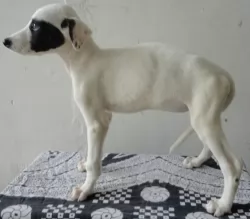 In height, the Rampur Greyhound stands at between 55 and 75 cm and they weigh in the region of 27 to 30kg.
In height, the Rampur Greyhound stands at between 55 and 75 cm and they weigh in the region of 27 to 30kg.
They are much the same as other greyhounds, but they’re somewhat wider and just a little bit more muscular. The head too, is broader than the slimmer head of the English Greyhound. Of course these dogs are known for the slim, pointed nose, the high-set ears which are sometimes half-floppy, half-erect. The eyes are large and the tail is long and slim.
The coat is short and smooth and is in colors such as gray, fawn, some white, some black with white and some brindle.
Your Rampur Greyhound is social around his human family, lapping up all their attention. He is the kind of dog that can be seen sprinting at high speed over the fields, but he is also not averse to lying peacefully with you on the sofa.
He is far better suited to a home with large gardens or on a farm as opposed to being confined to a small property in the city.
He can be gentle but when required, he becomes an excellent watchdog. He will need training and socialization as he can be rambunctious indoors, knocking things over. Training makes him obedient and restrained They get on well with children and other pets in the home.
 Siberian Huskies are said to be one of the beautiful dog breeds in the world. They are well known for their thick coat and blue coloured eyes. Siberian Huskies are really challenging for new dog owners. It is preferred to give them a fenced yard and the fence should be sunk well to the ground to prevent them from escaping, as they always try to escape. They are medium sized working dogs having high energy level. Initially huskies were developed as sled dogs.
Siberian Huskies are said to be one of the beautiful dog breeds in the world. They are well known for their thick coat and blue coloured eyes. Siberian Huskies are really challenging for new dog owners. It is preferred to give them a fenced yard and the fence should be sunk well to the ground to prevent them from escaping, as they always try to escape. They are medium sized working dogs having high energy level. Initially huskies were developed as sled dogs.
They are affectionate and intelligent breed. Also they are independent in nature. They are kid friendly dogs and also are friendly with everyone including strangers. Siberian Huskies will be a good companion when given proper training and care. They are low shedders but it depends on the climate it lives. Normally they dont shed in cold climate but in warmer climate they will do. They shed heavily twice in a year for a three week strech. Normally Siberian Huskies do not suit well for apartment living. They are not watchdogs as they will bark very rarely but it enjoys to howl.
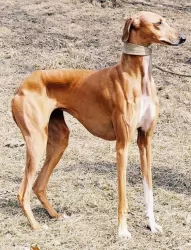 Everyone loves the Rampur Greyhound, and why not? He is fantastic with children because of his gentle, loving nature. He is a playful dog too and will require a daily dose of exercise.
Everyone loves the Rampur Greyhound, and why not? He is fantastic with children because of his gentle, loving nature. He is a playful dog too and will require a daily dose of exercise.
They aren’t noisy dogs, being naturally timid, but he still loves to get out and about with his daily walk to see and experience new sights and smells.
When you bring a Rampur Greyhound into your home, you’re bringing in a whole lot of wonderful companionship, love and loyalty from this remarkable canine.
 Siberian Huskies are very much affectionate with children. But it is necessary to train both parties to behave with each other. It is recommended to have an adult supervision for younger children.
Siberian Huskies are very much affectionate with children. But it is necessary to train both parties to behave with each other. It is recommended to have an adult supervision for younger children.
They are very good diggers and so they should be watched if they are in garden. They tolerate well in cold weather and mostly huskies can be seen in the area of snow falling. They are very good in pulling sledges.
They adapt well in cold weather. It is advised to give them a well fenced yard. They do not like apartment living. Also they do not like to be alone and if kept alone for long time they will disturb your house and make it dirty.
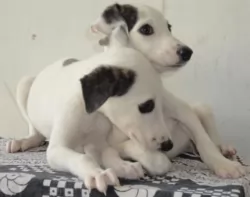 Rampur Hounds are generally a healthy dog breed, and their health is enhanced when you take good care of them and provide them with lots of love, good food and exercise.
Rampur Hounds are generally a healthy dog breed, and their health is enhanced when you take good care of them and provide them with lots of love, good food and exercise.
Still, every dog can fall prey to any one of the many dog illnesses there are such as cancer, bloat, diabetes, ear infections, epilepsy, obesity, eye problems and others.
This can be deadly for your dog. Gas collects in the stomach and the stomach can twist. You’ll notice your dog has a hard, swollen stomach and he is lethargic, but restless. Getting him to the vet as quickly as possible should be a top priority.
Your pet can develop all kinds of skin problems where he bites and scratches, causing bacteria. It can be terribly painful for your pet, and even ticks and fleas on the skin can cause cause a lot of irritation for your pet.
Some people add in omega 3 oils to their pet’s diet to help with dry skin. Don’t let your pet suffer with skin allergies and other problems that are itchy and painful. Get him to the vet so you can get to the root of what is causing him so much frustration with his skin.
 Siberian husky suffers with minor health problems such as hypothyroidism, Progressive retinal atrophy and cataract. They are also prone to lose pigment in nose and muzzle. Some health problems occur due to bad breeding practices and some due to environmental problems where the puppy is brought up. They have also chances to get skin disease such as allergies.
Siberian husky suffers with minor health problems such as hypothyroidism, Progressive retinal atrophy and cataract. They are also prone to lose pigment in nose and muzzle. Some health problems occur due to bad breeding practices and some due to environmental problems where the puppy is brought up. They have also chances to get skin disease such as allergies.
When they are in the age of 2 to 5 years, they are having chances to hairloss due to Alopecia X. This condition mainly causes due to hair clipping in Siberians. They will be healthy but the hair will not grow in affected areas. Siberians are double coated and when the situation prevails the topcoat will fall off first and the undercoat follows it. The hair will fall off in both side of the dog in same area. Spaying or neutering will reduce such problems as it causes because of sex hormones.
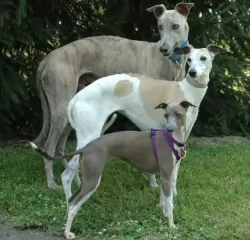 Active and playful, your Rampur Hound will need a lot of space to let off steam and run. He will look forward to his walks every day with you. Maybe you’ll need a tennis racquet to hit the ball far enough for him to sprint after.
Active and playful, your Rampur Hound will need a lot of space to let off steam and run. He will look forward to his walks every day with you. Maybe you’ll need a tennis racquet to hit the ball far enough for him to sprint after.
These dogs, with their short coats, are considered to be low maintenance, even though they do shed.
A good brush twice a week will do them good and they just love being massaged. It’s your time to run your hands over the slim, muscled body to make sure there are no unusual lumps on him.
Follow a regular grooming regime when you brush him. Check inside his ears, have a look at his eyes to make sure they’re still bright. Check inside his mouth for bad teeth which could be causing him terrible pain and make sure to trim his nails.
To be healthy and content, every dog needs good food.For convenience it can be great to feed your Greyhound one of the high quality commercially manufactured dog foods. To vary the food occasionally, add in some delicious home-made food too.
Once or twice a week you can simply add some home-made food to the dry kibble. Boiled chicken, brown rice or pasta and spinach, sweet potatoes and carrots are a healthy choice for your pet. Nothing complicated.
If you cook it in bulk, you can chop it all up and feed smaller portions to your pet. Some raw meat added in from time to time will also keep him healthy.
A simple meal like this will please your dog no end. No exotic spices and strange, weird kinds of food which could upset his stomach – just plain and simple the way dogs love it.
Ensure there is always a bowl of fresh, cool water within his reach.
 In one method of feeding the Husky puppies, the food will be given always available, but this method is not recommended as it has some problems. This method is followed by large breeders because of lack of time to spend on individuals. Another method is to keep meal for 3 times a day. At about 12 to 16 weeks of age the meals can be reduced to two times a day. In this method the meal given should not be there after 15 minutes even if puppy did not ate. The important training for Husky puppies while eating is they should not growl when the food is taken by its master.
In one method of feeding the Husky puppies, the food will be given always available, but this method is not recommended as it has some problems. This method is followed by large breeders because of lack of time to spend on individuals. Another method is to keep meal for 3 times a day. At about 12 to 16 weeks of age the meals can be reduced to two times a day. In this method the meal given should not be there after 15 minutes even if puppy did not ate. The important training for Husky puppies while eating is they should not growl when the food is taken by its master.
Many Siberian experts don't like commercial dog food as they are sure that because of such foods dog may get problems like itching, dandruff, loose stools and hot spots. According to experts the good food for them are home cooked food from turkey, real chicken, beef and fish. Fruits and fresh vegetables are also very good for them. It is advised by dog owners to add only low salt or even without salt in their food. Also sugar is not good for them as it will bring some problems like hairfall and itching.
Siberian huskies can be easily groomed. Their eyes should be checked in puppyhood as they get chances to get eye problems and hereditary eye diseases. It is advised to make siberians to bath once in a year and they must be brushed once in a week. While brushing, the ears should be inspected and its teeth should be brushed. It is good to trim the long hairs in their feet and also nails should be trimmed slightly and very carefully as they have blood vessels there.
To give training and exercises to Siberian Huskies, the home should be prepared for them and it is better to make a fenced yard to prevent escapes. They have very high chances to escape and so the fence should be minimum 6 feet high and base should be strong as it should not break it or dig under to escape. Since they are active from their puppyhood they must be given lots of exercise. They should be socialized in their early stages as to get good behaviour and manners.